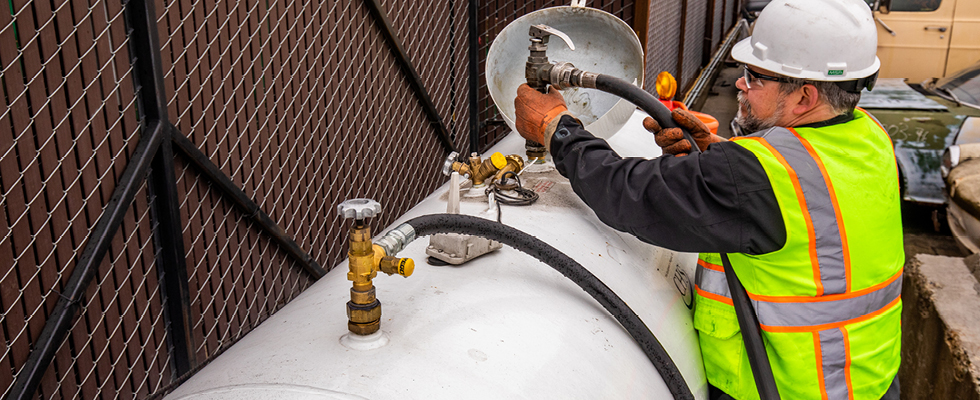
In the propane industry, where safety, compliance and reliability drive best practices, proactive propane maintenance has become a business imperative. From underground tanks and transport fleets to bulk plants and retail terminals, companies are investing in preventative protocols that do more than just reduce downtime. These measures enhance safety, extend equipment life and help mitigate the risk of costly incidents.
Addressing an Aging Problem: Tank Maintenance
Properly maintained domestic propane tanks, both below- and aboveground, should be regularly monitored for safety and efficiency. Retail propane companies should ensure that aboveground tanks, whether owned by the company or the customer, are fit for filling. Summer is the perfect time to ensure tank blocks provide clearance above the ground, physical damage hasn’t occurred and the tank’s coating is sufficient. Additionally, it helps to take a few extra minutes to educate your customers on any important regulatory updates, as well as your company’s expectation related to vegetation and objects around the tank.
For underground tanks, there’s not much to see, which presents certain challenges. Of course, inspection of the valves and piping is required, but so is ensuring the cathodic protection continues to provide said protection. Otherwise, whether old or new, an underground tank’s lifespan could be cut short prematurely.
Cathodic protection works by using a sacrificial anode to draw electrons away from the steel tank, effectively preserving its structural integrity.
According to NFPA 58 (the National Fire Protection Association’s Liquefied Petroleum Gas Code), cathodic protection systems must first be tested upon installation, then 12 to 18 months after the first test and then every three years. The test involves placing a probe into the ground and measuring electrical potential with a multimeter, which confirms whether the protective system is still functioning. The code requires the two most recent tests to be retained.
Spring and summer are ideal testing seasons due to soil moisture levels. These seasons are also a great time for companies to conduct inspections before the ground freezes.
Bulk Plant & Terminal Vigilance
While large wholesale terminals are subject to the Occupational Safety and Health Administration’s Process Safety Management (PSM) standards, which mandate hazard analysis and mechanical integrity programs, most retail bulk plants are exempt. However, for all bulk plants, certain sections of PSM may provide valuable guidance to ensure bulk plant compliance and safety.
For example, some companies are finding it beneficial to occasionally bring in third-party inspectors to assess tanks, valves and piping. These inspections have proved valuable to ensure compliance with the latest codes. For example, a substantial code change to bulk plant requirements in NFPA 58 occurred in 2011, making inspections especially useful to ensure a bulk plant remains compliant to the newest version of the code.
These evaluations often involve elements of a mechanical integrity program. In these inspections, wall thickness is measured, identifying early signs of corrosion or fatigue. While not required and potentially viewed as an additional cost, these proactive inspections have proved effective at catching issues before they lead to operational disruptions or incidents.
Routine care, such as repainting tanks and applying protective coatings, also plays a role. Though simple, these measures significantly delay corrosion and preserve the service life of equipment. And with summer being a slower time for propane distribution, it is a perfect time to evaluate equipment and complete maintenance.
Enhancing Safety Through Smarter Fleets
Proactive maintenance extends to delivery vehicles. Bobtail trucks, which deliver propane to homes and farms, are subject to regulations from the U.S. Department of Transportation (DOT), including routine safety inspections.
To reduce risks and improve efficiency, many companies are adopting new truck technologies, such as rear-facing cameras, backup proximity sensors, ergonomic rear fills and auto-neutral gear systems. Considering a company standard for new equipment and retrofitting existing equipment may pay dividends with reduction of incidents, vehicle repairs and property damage. Backing in and out of some homes can be a challenge for bobtail drivers. Providing additional technology on their trucks helps reduce risk.
These nonmandated upgrades can improve driver safety, protect equipment and reduce accidents. Businesses taking these measures demonstrate how the industry is taking opportunities to increase safety and going beyond the minimum requirements.
Efficiency & Safety in Consumption Billing
Though not directly a maintenance strategy, consumption billing offers important benefits in operational efficiency and customer safety. By placing meters on customer tanks and billing them based on actual usage, propane companies can avoid “out-of-gas” scenarios that can trigger service disruptions or accidents. From an equipment perspective, it helps avoid situations where customers consider altering their propane systems and ruin equipment.
This model, similar to natural gas utilities, also provides a monthly payment structure that may be more accessible to some customers. While not yet widely adopted, early pilots suggest this approach has the potential to enhance safety and customer trust — two pillars of successful propane operations. Plus, it increases retail company efficiency, reducing trips out to customers.
Building a Maintenance Culture
Even the best equipment needs structured oversight. That’s where retail leadership and systems like computerized maintenance management systems (CMMS) come into play. These platforms help companies log, schedule and track maintenance activities in alignment with manufacturer recommendations and internal policies.
It’s not just about knowing how to inspect a tank or replace a valve — it’s about building a company culture that values preventative work and embeds it into daily operations. Successful programs rely on strong management direction, seasonal planning (especially before winter demand spikes) and clear accountability. Voluntarily adopting some PSM principles where they are not required, such as routine hazard analysis and mechanical integrity inspections, can yield enormous dividends in both equipment longevity and operational stability.
A Call to Action for Proactive Propane Maintenance
For propane retailers and suppliers, the choice is clear: There’s value in consistently implementing proactive maintenance programs when working with customers. Some initial ideas to consider include:
- Spend extra time with customers to educate them on propane equipment maintenance (painting, excessive vegetative growth, etc.)
- Follow company policies and equipment manufacturing recommendations
- Incorporate systems to embed maintenance into daily routines
- Explore inspection programs to ensure equipment is functioning properly and up to code
- Evaluate options that go above and beyond the norm that can increase safety and equipment longevity (i.e. back-up cameras for bobtail trucks)
Whether through cathodic testing, fleet enhancements or inspection of bulk plants by third parties, proactive maintenance is a priority that can pay dividends in reducing downtime, enhancing safety, extending equipment life and mitigating the risk of costly incidents.


